Editorial
‘Patriots’ and ‘traitors’

Thursday 28th July, 2022
The Rajapaksas and their cronies have not stopped making themselves out to be patriots in spite of having bankrupted the country and inflicted unbearable suffering on the public. Chief Government Whip and Minister Prasanna Ranatunga, taking part in the Emergency debate in Parliament, yesterday, launched into a tirade against anti-government protesters whom he accused of having insulted the police and the armed forces personnel. Painting a black picture of them as the scum of the earth chasing the dragon, and engaging in other such nefarious activities on the pretext of protesting against the government, he asked them to stop causing affronts to the dignity of the armed forces and the police.
True, there have been several instances where some of the Galle Face protesters sought to denigrate the military and the police, but their streams of invectives pale into insignificance in comparison to what the newfound friends of the Rajapakasa, who have evinced a proprietary interest in patriotism, said about the armed forces.
It has been rightly said that adversity makes strange bedfellows. When caught in swirling flood waters, even mongooses and cobras stop fighting and cling on to floating logs in a bid to save their dear lives. The SLPP and the UNP are doing likewise at present. A few years ago, the Rajapaksas, wrapping themselves in the flag, branded the UNP as a party of traitors, and its claim yielded the intended results politically and electorally. But, today, the ‘patriots’ and the ‘traitors’ have joined forces and are suppressing the rights of the public. UNP leader Ranil Wickremesinghe has become the saviour of the beleaguered Rajapaksa family. After the 2005 presidential election, he accused the Rajapaksas of having engineered his defeat by bribing the LTTE into staging a polls boycott in the North and the East, where he was popular. He can now be happy that the Rajapaksas have finally helped him realise his presidential dream by delivering the SLPP MPs’ votes to him in Parliament. It could be considered an act of reparation?
Minister Ranatunga may recall that the armed forces and the police suffered many indignities at the hands of the LTTE thanks to a ceasefire agreement the then UNP government entered into with Prabhakaran in the early noughties. LTTE cadres used to surround some army bunkers and lift their sarongs, exposing their derriere in addition to heaping abuse on the troops who had been ordered not to retaliate. (The Galle Face protesters did not go that far, did they?) While the army was advancing in the North amidst heavy casualties, at the height of the war, the UNP grandees used the floor of the House to ridicule the frontline troops marching through minefields against heavy enemy fire. Wickremesinghe himself sought to dismiss the capture by the army of Thoppigala in the East as something worthless. He told Parliament that Thoppigala was a dense jungle of little strategic importance. Lakshman Kiriella, who was in the UNP at the time, declared in Parliament that any fool could wage war, and Ravi Karunanayake claimed that the army had become so disoriented owing to LTTE attacks that it was moving in the direction of Medawachchiya thinking that it was heading towards ‘Kilinochchiya’, and had mistaken Pamankada (in Colombo) for Alimankada (in the North).
The government may frown on the theatrics of washed-up actors and actresses, anarchists and drug addicts, at the Galle Face protest site, but it must heed the voice of the ordinary public, who are undergoing untold suffering. It must not make the mistake of bracketing the hapless public with the aforesaid undesirables and tarring and feathering all of them. Aragalaya is only the tip of the iceberg of public anger; it is the irate public who took to the streets against President Gotabaya Rajapaksa, and caused his ouster; they will do so again if the government resorts to coercion instead of redressing their genuine grievances. A government which is not capable of even ensuring an equitable distribution of available fuel stocks is not simply worth its salt.
Former combat officers holding key positions in the defence establishment had better tread cautiously without allowing themselves to be used as a cat’s paw by wily, self-seeking government bigwigs to pull political chestnuts out of the fire. One can only hope that the armed forces and the police will see through the wiles of the politicians who are trying to pit them against the public to compass their sinister ends.
Editorial
Draining Diyawanna swamp

Thursday 21st November, 2024
The JVP added Sinhala slang, jilmaat, meaning trickery, to Sri Lanka’s political lexicon, after the 2010 presidential election; it claimed that the then President Mahinda Rajapaksa had secured a second term by means of a computer jilmaat, but it could not prove that allegation. However, there have been numerous instances of legislative and constitutional jilmaat in this country, and they are responsible for the rapid rise of anti-politics. Veteran leftist and former Cabinet Minister D. E. W. Gunasekera has, in a brief interview with The Island, pointed out how a questionable constitutional amendment has been gnawing away at public trust in the electoral process since 1989.
A report in this newspaper yesterday quoted DEW as having said that the 14th Amendment, which inserted Article 99A into the Constitution, in 1988, providing for the appointment of defeated candidates as National List (NL) MPs, was different from the original Bill approved by a Parliamentary Select Committee (PSC). He has said the then Prime Minister Ranasinghe Premadasa, who headed the PSC at issue, himself revealed that fact during a parliamentary debate, but no remedial action was taken.
The deplorable practice of appointing defeated candidates to Parliament is violative of the people’s franchise, and a Bill containing such provision would not have survived judicial scrutiny, and therefore it is possible that the J. R. Jayewardene government resorted to some constitutional jilmaat to secure the passage of the 14th Amendment with the questionable section.
No government has cared to amend Article 99A in spite of their much-avowed commitment to democratic best practices. All political parties have shamelessly used this constitutional provision to smuggle in defeated candidates into Parliament. As long as Article 99A remains unchanged, it will not be possible for the people to get rid of any MP by defeating him/ her in a general election if he/she is in the good books of his/her party leader and his/her party polls enough votes to secure NL slots. Even the JVP-led NPP, which pontificates ad nauseam about democracy, morals and ethics, has appointed defeated candidates as NL MPs. Two of its 159 members in the new Parliament are candidates rejected by the people in last week’s election. The New Democratic Front is embroiled in a dispute over its two NL slots which a large number of its defeated candidates are said to be eyeing.
It is also possible for political party leaders to engineer NL vacancies to appoint anyone of their choice as an MP owing to Section 64 (5) of the Parliamentary Elections (Amendment) Act passed in 1988. All political parties have made use of this despicable legal provision to make NL appointments. Such reprehensible laws have come to stay because once they are ratified by Parliament, they become faits accomplis owing to the absence of legal provision for the post-enactment judicial review of legislation, the need for which cannot be overstated in a country like Sri Lanka, where governments do not respect even the entrenched clauses in the Constitution. It may be recalled that in January 2024, the Rajapaksa-Wickremesinghe government, which bulldozed its way through, arbitrarily declared that its draconian Online Safety Bill had been passed amidst a noisy protest in the House. In 2017, the Provincial Council Elections (Amendment) Bill was passed in a questionable manner, with some sections incorporated into it at the committee stage to postpone the PC polls on the pretext of increasing female representation. It was a typical Christmas Tree Bill, which was substantially different from the Bill gazetted, tabled in Parliament and examined by the Supreme Court. Sadly, yet unsurprisingly, all political parties represented in Parliament at the time voted for that bad Bill, enabling its passage with a two-thirds majority!
The onerous task of draining the Diyawanna swamp, which the NPP has undertaken to perform, should not be limited to ridding the legislature of undesirables; Parliament must also be made to right the wrongs it has committed under previous governments if public trust therein is to be restored. Let the NPP government be urged to use its supermajority to amend Article 99A and Section 64 (5) of the Parliament Election Act as a national priority to prevent the appointment of defeated candidates and those who are neither unsuccessful candidates nor NL nominees as MPs. Similarly, urgent action should be taken to enable the post-enactment judicial review of legislation. That is the least the self-righteous JVP/NPP leaders can do to atone for the sin of having appointed defeated candidates as NL MPs. No clean-up of Parliament will be complete unless the new government takes action to safeguard the people’s franchise, which is the bedrock of democracy.
Editorial
Kiri-Kekiri dilemma and need for austerity

Wednesday 20th November, 2024
The JVP-led NPP asked for a mandate to clean up Parliament, and received a mammoth majority for that purpose. Its stalwart bragged that they had asked for brooms but the people had given them bulldozers. A fish is said to rot from the head down, and therefore Parliament has to be cleansed as a national priority. Let the clean-up begin!
One can only hope that the latest regime change will not lead to another false dawn like the one described in Orwell’s dystopian novella, Animal Farm, where the Pigs, after a successful revolt, decree that ‘all animals are equal, but some animals are more equal than others’. The new MPs and ministers must not be allowed to place themselves above the public and lead the life of Riley. After all, that is what the NPP promised during its presidential and parliamentary election campaigns.
In the late 1980s, during its second uprising, the JVP coined a pithy slogan to mobilise the rural youth against the UNP government of the day, by highlighting a glaring urban bias in resource allocation—kolombata kiri, gamata kekiri (‘Milk for Colombo and kekiri cucumbers for the village’). Under a JVP-led government no room should be left for the people to say ‘methi-amathilata kiri, janathawata kekiri—‘milk for MPs and ministers, and kekiri for the public’.
Indiscipline, corruption, violence, brawls, dereliction of duty, waste, and the MPs’ privileges and perks were the key factors that turned public opinion against Parliament to the extent of a mob led by the JVP trying to march on it in 2022. The JVP, which failed to give Parliament a shake-up with bombs and mobs, and its alter ego, the NPP, are now in a position to achieve that goal democratically. Everything possible must be done to reduce the cost of maintaining Parliament and its members.
SJB MP Hesha Withanage has made a very progressive suggestion, which should have come from the JVP/NPP; he has urged the new government to make all MPs and ministers serve the public on a voluntary basis. The MPs’ official residences in Madiwela are being repaired at a massive cost to accommodate the members of the 10th Parliament, we are told. Addressing the media, yesterday, MP Withanage demanded that the MPs’ housing scheme be handed over to a university which lacks hostel facilities for its students. He said so during the last Parliament as well and his position on curtailing state expenditure on maintaining Parliament and the MPs has been consistent.
Withanage has also called for an end to the practice of providing the MPs with heavily subsidised meals in parliamentary canteens. It is doubtlessly unfair to pamper the MPs while the people who voted for them are struggling to dull the pangs of hunger. Secretary General of Parliament Kushani Rohanadheera, taking part in a television programme the other day, sought to pooh-pooh the claim that the MPs partake of sumptuous meals at ludicrously low prices in the parliamentary canteens, where, she claimed, only ordinary dishes were served. If so, let the menus and the expenditure on victuals served in the parliamentary restaurants during the past six months or so be made public so that the people will know whether their representatives have been eating bandakka and kekiri, as Rohanadheera has claimed.
It is puzzling why the NPP has appointed a 21-member Cabinet to do what three ministers had done for nearly two months. It would have made sense if about 15 ministers had been appointed with an equal number of deputy ministers. When the delayed Provincial Council elections are held, there will be 45 ministers in the provinces. Sectors such as health and education will have 10 ministers each—the Cabinet minister and nine provincial ministers. Sri Lankans are paying through the nose to maintain a bloated state service; there is a public official for every 14 citizens!
A country, which is in the throes of a crippling economic crisis and has defaulted on its debt, cannot afford to provide its MPs and ministers with perks that would make even their counterparts in the developed world turn green with envy. MP Withanage is right in having demanded that the MPs must not be given vehicles at the expense of the public. The most effective way to develop public transport is to make the people’s representatives share in commuters’ hardships by travelling in crowded buses and trains. Then only will they really feel the need to solve the chronic transport issues. The new government, as we have said in a previous editorial comment, should adopt the Swedish model in providing the MPs with facilities. In Sweden, only the Prime Minister is given an official car, and all others including the Speaker receive bus and train passes. They are free to use private vehicles but at their own expense.
The JVP-led government ought to manage state funds frugally, launch an austerity drive, lead by example and usher in national progress for the sake of the people, who answered its clarion call for action. The JVP should live up to its ‘anthem’, which its founder Rohana Wijeweera sang with gusto at party events to energise his supporters:
Kusata sagini/Hadata sogini/Gathata veraheli/Kebeli ella/sathuta senasuma ahimi karalu/Andura dinu kalaya gihilla/Nositha meri meri sathurpayata vakutu vee atha paya hakulla/Negitapalla, negitapalla/Numbalage kalaya evilla.
(Roughly rendered into English, it means that gone is the dark era when you suffered under enemy feet, in rags and on empty stomachs with hearts filled with sorrow; rise awake, your turn has come!)
Editorial
Close that smuggling tunnel

Tuesday 19th November, 2024
The NPP, the ITAK and the Sarvajana Balaya have appointed defeated candidates to Parliament via the National List (NL), making a mockery of their much-avowed commitment to democratic best practices. This has been the name of the game in Sri Lankan politics all these years and one of the main reasons for the erosion of public trust in the electoral process.
The NPP deserves praise for the appointment of a person with a visual disability to Parliament for the first time in Sri Lanka’s parliamentary history. It has fulfilled a long-felt need. Sadly, it has added not just a smidgeon but a scoop of cow dung to the proverbial pot of milk by appointing two of its defeated candidates as NL MPs.
It is said that in this country, in times of yore, some men were tricked into marrying not-so-attractive elder sisters of the women they were betrothed to. Times have changed and this kind of trickery is no longer heard of in matrimonial affairs, but a similar practice prevails in Sri Lankan politics; individuals other than those presented as NL nominees to electors are appointed MPs, and, worse, even total outsiders are brought in to fill NL vacancies, which are often created artificially.
Strangely, the Constitution and the Parliamentary Elections Act provide for undermining the people’s franchise in this despicable manner. As we have pointed out in previous editorial comments, Article 99A of the Constitution allows ‘the persons whose names are included in the lists submitted to the Commissioner of Elections … or in any nomination paper submitted in respect of any electoral district by political parties or independent groups at that election’ to be appointed to Parliament via the NL. In 1988, the then UNP government introduced Section 64 (5) of the Parliament Election Act, inter alia, as an urgent Bill, eroding the essence of the constitutional provisions pertaining to the NL.
The Parliamentary Elections Act of No 1 of 1981, as amended in 1988, allows ‘any member’ of a political party to be appointed to fill an NL vacancy. After parliamentary elections, political parties appoint their NL members, as prescribed by the Constitution, and thereafter engineer NL vacancies to bring in persons of their choice as MPs. It is not possible to have this highly undemocratic practice terminated by judicial means because there is no constitutional provision for the post-enactment judicial review of legislation. This ‘smuggling tunnel’, as it were, must be closed by Parliament itself.
Worryingly, it has now been revealed that the words, ‘any member’, were surreptitiously incorporated into the Parliamentary Elections (Amendment) Act after its ratification by Parliament in 1988!
Not everything the Constitution and other laws provide for is morally right and acceptable. The 18th constitutional amendment, which enhanced the executive powers of the President and removed the presidential term limit, had to be abolished because it was found to be detrimental to democracy. The 20th Amendment to the Constitution was done away with on the same grounds. Therefore, the flawed legal provisions that undermine the people’s franchise and sovereignty must be scrapped without further delay.
We suggest that Article 99A of the Constitution be amended to scrap the phrase, ‘in any nomination paper submitted in respect of any electoral district by political parties or independent groups’, and the words, ‘any member’ be removed from the Parliamentary Elections Act. This is something the NPP, which came to power, promising good governance, ought to do on a priority basis.
Given the shameful NL appointments at issue, it may not be difficult to imagine what the situation would have been if there had been no preferential vote mechanism; political party leaders would have had carte blanche to ensure the entry of unsuccessful candidates in their good books into Parliament at the expense of the deserving ones against the will of the people. That would have led to what is called the dictatorship of party leaders. Needless to say, an electoral process based on the proportional representation system without provision for voters to indicate their preferences for candidates will be antithetical to democracy. Hence the need to defeat efforts being made in some quarters to abolish the preferential vote.
-
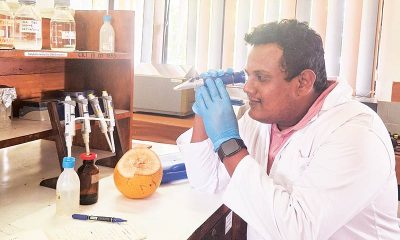
 Life style5 days ago
Life style5 days agoKing of coconuts heads for a golden future
-
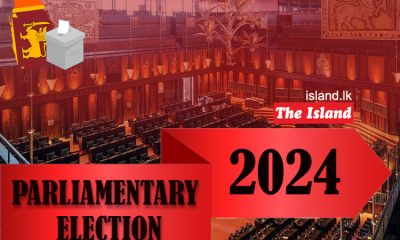
 Latest News6 days ago
Latest News6 days agoColombo district preferential votes announced
-
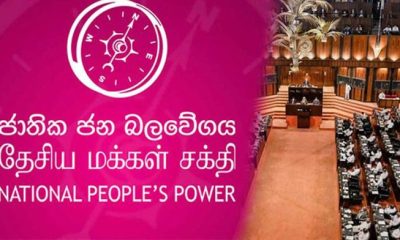
 News4 days ago
News4 days agoNPP appoints two defeated candidates as NL MPs
-
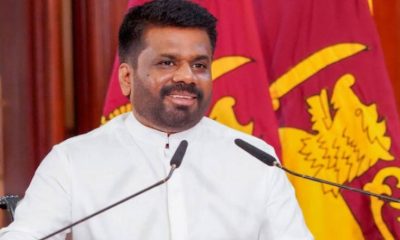
 News6 days ago
News6 days agoPresident warns his party: “We will fail if we view power as an entitlement to do as we please”
-
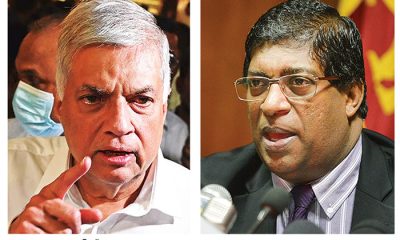
 News3 days ago
News3 days ago‘Gas Cylinder’ explodes; Ranil flays NDF Secy. for submitting Ravi’s name
-
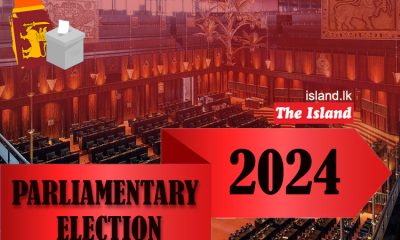
 Latest News7 days ago
Latest News7 days agoGampaha district: NPP 16, SJB 3
-
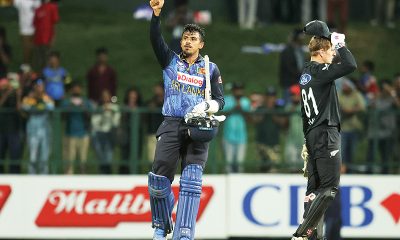
 Sports3 days ago
Sports3 days agoMaking batting compulsory for bowlers has worked – Theekshana
-

 Editorial6 days ago
Editorial6 days ago‘Maroon Wave’ and AKD Magic











